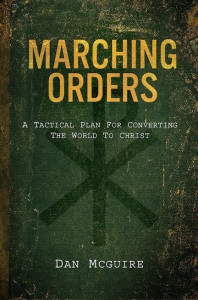Near the beginning of Marching Orders: A Tactical Plan for Converting the World to Christ (a more ambitious subtitle you will not find), Dan McGuire, a theologian and former Marine Corps officer, plainly states the premise of his book: “The primary spiritual combat of the twenty-first century is the battle against unbelief and apathy.” As it happens, it’s a battle we fight to convert both non-Catholics and “Catholics” alike, because as Mr. McGuire writes, “even those who are firm in their faith often lack sufficient knowledge of it,” which is fine if one is content to simply pray and avail oneself of the Sacraments; not so good if one intends to proclaim the Good News.
For the Church Militant the task is winning the war – in this case for souls – and that involves knowing the deployment of forces: those friendly to our mission and those opposed, and the strategies and tactics necessary to achieve eternal victory.
God, of course, is on our side. Enemies in wars almost always claim so, each for his own side, but it’s absolutely true for Catholic apologists, a source of both courage and confidence. Not to mention that, whatever losses may occur in all the skirmishes and battles ahead, we are assured of final victory.
Marching Orders, although not exclusively, is primarily a book aimed at men. It’s a recruiting call for knights. It’s a handbook of spiritual combat, and it is structured as the operations order before a battle typically is, with assessments of situation, mission, execution, administration and logistics, and, finally, command and signal.
So. . .
Situation: What are the weapons and who are the allies we take into the conflict; who is the enemy, how is he armed, and where are his strengths? We can’t be effective warriors for God if we haven’t undergone the kind of training that will fully arm us for battle. As the commander in this boot camp, McGuire provides his own insights and also quotes extensively the work of others – Frank Sheed and Hans Urs von Balthasar, for instance. “Situation” is the longest chapter, and it’s very much a catechetical orientation – the kind of “skull session” soldiers and athletes know well as the conceptual part of training.
Marching Orders would be an even better book had the author and publisher been utterly consistent in citing sources. Sheed’s Theology and Sanity is cited, for instance, but not the specific work of von Balthasar that McGuire quotes at one point, which strikes me as odd in a book under the aegis of Catholic Answers, perhaps the leading publisher of apologetics. But this is a quibble, especially since every Scriptural quote is accurately cited.
Proper assessment of the situation comes from Scripture, Sacraments, Sacred Tradition, angels, spiritual advisors. . .and art, and beauty. And McGuire wisely includes a dossier on the enemy general. Know thy Satan. And his minions and his methods.
There’s a wealth of common sense in this first chapter, not least Prof. McGuire’s discussion of no-go zones, the DMZs of evangelization: funerals, the workplace, the cocktail party. The Catholic Church is not the Westboro Baptist Church. There’s a time to speak out and a time to be silent.
Mission: Simply stated: convert yourself before attempting to convert others, so you and they reach heaven. One writer whom McGuire often quotes is Lorenzo Scupoli (1530-1610), author of The Spiritual Combat, who was very aware of how pride can infiltrate conversion, and lead us away from true service to Christ. A soldier’s dedication to duty (via practice of prayer and the Sacraments) is absolutely necessary.
McGuire is especially good in addressing the current thorny environment into which evangelists must deploy. Basically, it’s the Battle of Lake Woebegon: I’m special! How dare you tell me my life is incomplete! Safe space!!! It’s hard in such cases to speak of judgment, that each of us has “a hand in our own judgment, or that we are forced to judge ourselves and prevented from being less than honest.”

Execution: This is mostly about breaking down the initial “defenses” of the potential convert. It entails, for one thing, demonstrating that faith and reason are compatible; that, in fact, given what we know of the world, faith is reasonable. This chapter includes a condensed presentation of the kinds of arguments, good and bad, that succeed or fail in the real world. And McGuire provides a nice introduction the style and substance of Aquinas, the best reasoner of the last thousand years.
Administration and logistics: This is about the “beans and bullets” and “Band-Aids and bad guys” of evangelization: of prayer and the Eucharist; of love and knowledge (and the sources of knowledge); of Confession and spiritual direction; and of bad spirits and bad people. But really it struck me that the key here is self-sacrifice, because we are beset by temptations ancient and modern, and we have to make tough decisions, especially about ourselves, in order to avoid sin. Forewarned is forearmed.
Command and signal: Yes, there’s a chain of command in the Church, and, yes, it’s become a controversial matter for many Catholics, active and lapsed. But it’s an especially difficult conceptual hurdle for most Americans who aren’t Catholic, since nearly all other Christian denominations and non-Christian faiths are extremely decentralized: often without either a Catechism or a hierarchy. This may make the Barque of Peter seem like a barnacle-encrusted ghost ship. But I know from my own conversion many years ago how wonderful learning about the Apostolic Succession can be.
You can buy Marching Orders through The Catholic Thing store at Amazon by clicking here.
















